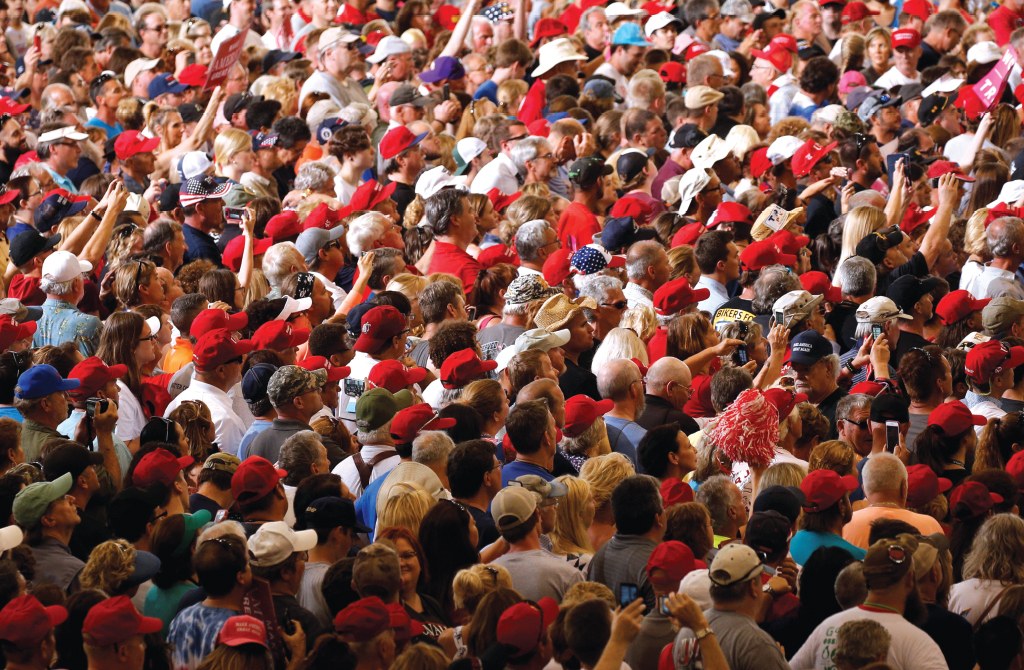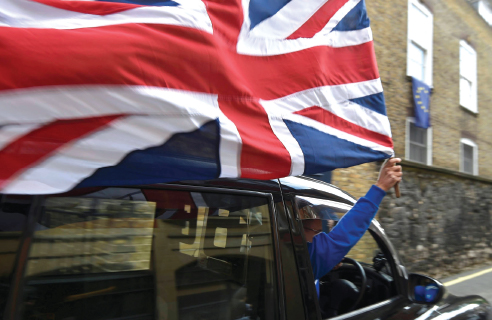
The promise of a better future typically invokes a past that never was.
Around the globe, widespread disillusionment has given rise to populist leaders who romanticize the past
and incite unease in the face of social change. Their simple answers vary: Barring and
expelling newcomers. Swift, brutal justice for lawbreakers. Blocking trade with nations
that supposedly steal jobs. What these leaders share in common is a troubling disdain for tolerance, inclusion, due process and the basic assumptions of democracy.
Education
In
Action

Quick Change
The election of Donald Trump. Turbulent politics in Europe. Trade protectionism. Anti-migration policies. The physical fencing of borders. Attacks on the media. The ongoing abuse of human rights. We see the markers of disruptive, divisive change everywhere in the global landscape. It’s hard to predict how deeply and permanently they’ll reshape the world. But whatever actions and consequences unfold today will form the legacy that young people must contend with for decades to come.
These were the kinds of issues explored at a Munk School event called “The world is changing, are you ready?” Presented in partnership with the University of Toronto Centre for International Experience and U of T’s Hart House, the March 2017 gathering brought together students from different backgrounds and disciplines to discuss the rise of nationalism globally – expanding their understanding, inspiring them to learn from one another and identifying opportunities to create meaningful change. Students from all three U of T campuses assembled in the Great Hall of Hart House and were connected virtually to groups at the Reims campus of Sciences Po in France and Indiana University Bloomington in the U.S.
The international conversation was moderated by journalist Natasha Fatah of CBC News and included contributions from several student presenters, as well as Doug Saunders, international affairs columnist with The Globe and Mail. After participants had shared their ideas, opinions and fears in question-and-answer and breakout sessions, they were challenged to turn talk into action through practical plans to foster social change on their respective campuses.
Research
Leadership

Best Before?
Emerging threats to democracy around the world are a key focus of inquiry for Prof. Lucan Ahmad Way, who teaches in the Munk School’s Ukrainian Studies Program of the Centre for European, Russian, and Eurasian Studies. On the one hand, Prof. Way’s research has led him to conclude that the democratic tradition – contrary to widespread belief – has not undergone a recent rapid decline. By virtually any measure, the number of states that can be called democratic has remained unchanged since the beginning of the current century. That said, seemingly well-established democracies such as Hungary have become “competitive authoritarian regimes,” retaining traditionally democratic institutions but compromising their intent with significant authoritarian abuse. And in a January 2017 op-ed article in The Washington Post, Prof. Way and Prof. Dan Slater of the University of Chicago warned that American democracy on the eve of the Trump inauguration was likewise under significant threat, following an election beset by rampant misinformation, claims of FBI interference and repeated efforts to manipulate voting rules at the state level.
Moreover, in Prof. Way’s view, democracy has been under threat in the U.S. since well before the rise of Donald Trump – and indeed does not have the deep historical foundation that many assume. In an April 2017 article in Foreign Affairs entitled “Is America Still Safe for Democracy? Why the United States Is in Danger of Backsliding,” he and two co-authors argued that it was only in the early 1970s, once the civil rights movement and changes in federal law managed to stamp out authoritarianism in southern states, that the U.S. truly became democratic. Yet this very process had the effect of polarizing Congress, realigning voters along racial lines and radicalizing the Republican party. The resulting political divisions have both facilitated President Trump’s rise and left democratic institutions more vulnerable.
Is America Still Safe for Democracy?
Why the United States is in Danger of Backsliding
Public
Engagement

HUGE U.S. Election Analysis
In the weeks before and after the U.S. election on Nov. 8, 2016, the Munk School presented a series of events to help make sense of the presidential race, while faculty members contributed to the wider conversation through media interviews, op-ed articles and commentary.
Pre-election
A well-attended Sept. 19 event – part of the F. Ross Johnson-Connaught Speaker Series – brought together Marcus Brauchli, a former editor at The Washington Post and The Wall Street Journal, and John Stackhouse, former editor of The Globe and Mail, for an informal chat about the U.S. campaign, Donald Trump’s ascent and the part played by the media in his success to that point.
A week later, the Centre for the Study of the United States (CSUS) presented “Trump or Hillary? Forecasting the U.S. Election,” featuring Natalie Jackson, senior polling editor, Huffington Post; Michael Lewis-Beck, professor emeritus of political science, University of Iowa; Helmut Norpoth, professor of political science, Stony Brook University (one of the only forecasters to predict a Trump victory); and Matthew Lebo, professor of political science, Stony Brook University, and visiting professor at the University of Toronto.
In addition, CSUS co-sponsored a public lecture by Prof. Theda Skocpol of Harvard University on the Tea Party and the rise of the Republican party, as well as a special event for students in the American studies undergraduate program featuring two former members of Congress.
Election night
CSUS co-sponsored an event at Toronto’s Albany Club organized by the consulting firm Navigator, and also collaborated with the U.S. Consulate on an “election watch” that drew a large audience from the Toronto area.
The morning after
In the wake of Donald Trump’s upset victory, the U.S. Consulate supported a breakfast event at the
Munk School billed as “The Morning After: Implications of the Election results for Canada-U.S. Relations.” The panel discussion, broadcast live on CPAC, included Prof. Christopher Sands, director of the Center
for Canadian Studies at the School of Advanced International Studies at Johns Hopkins University;
Laura Dawson, director of the Canada Institute at the Wilson Center in Washington, D.C.; and Deanna Horton, a fellow of the Munk School.
Post-election
The Munk School partnered with the Public Policy Forum to host a Nov. 21 event in Ottawa examining the implications of a Trump presidency for Canada. Panellists included David Jacobson, former U.S. ambassador to Canada; Laura Dawson of the Wilson Center; former Republican congressman Robert Smith Walker; and Michael Coates, president and CEO of Hill+Knowlton Strategies Americas.
A January 2017 CSUS event, co-sponsored with U of T’s School of Public Policy & Governance and Samara Canada, featured Jocelyn Kiley, a lead researcher with the Pew Research Center, who presented preliminary findings derived from the massive amount of election-related data gathered by her polling organization.
And just prior to the new president’s Jan. 20 inauguration, CSUS hosted a videoconference with representatives from Sciences Po in France to consider the question on millions of people’s minds: “What now?”

